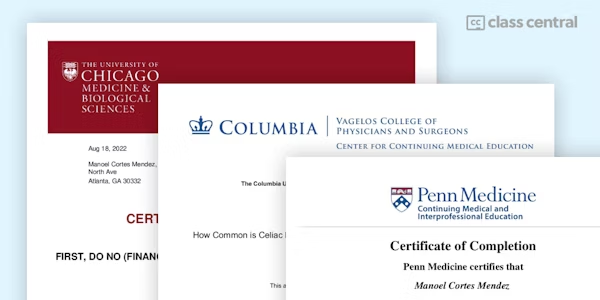Medicinal Chemistry
Indian Institute of Technology Madras , Indian Institute of Science Education and Research, Pune and NPTEL via Swayam
-
352
-
- Write review
Overview
The main objective of this course is to familiarize students with the fundamental concepts of drug discovery and development. The course is intended for students who have a background in chemistry and interested in the process of drug discovery. The intended outcome is to train students on various aspects of new drug discovery/development, drug screening, target identification, lead discovery, optimization and the molecular basis of drug design and drug action.INTENDED AUDIENCE : Third year undergraduates of B.Sc. Chemistry; M.Sc. Chemistry students and doctoral students PREREQUISITES : Any student who has done basic organic chemistry and has some knowledge of biochemistry with an interest in drug discoveryINDUSTRY SUPPORT : Companies in the pharmaceutical sector may recognize and value this course.
Syllabus
Week 1: An overview of drugs and drug targets; structure of a cell; intermolecular binding forces; classification of drugs.
Week 2: Principles of enzyme structure, catalysis and inhibition in drug discovery: Enzyme mechanisms overview; enzyme catalysis and inhibition in drug discovery; reversible and irreversible inhibitors; transition-state inhibitors; case studies
Week 3:Principles of enzyme structure, catalysis and inhibition in drug discovery: Enzyme mechanisms overview; enzyme catalysis and inhibition in drug discovery; reversible and irreversible inhibitors; transition-state inhibitors; case studies,Receptors function and ligand binding interactions; Ion channel receptors; kinase-linked receptors; G-Protein coupled receptors, drug-receptor interaction; dose-response curves; case studies
Week 4: Receptors function and ligand binding interactions; Ion channel receptors; kinase-linked receptors; G-Protein coupled receptors, drug-receptor interaction; dose-response curves; case studies
Week 5: Nucleic acids structure and function; DNA Interactive agents and chemotherapy: DNA binding agents; intercalation and alkylation; DNA strand breakers; case studies
Week 6: Synthetic methods in medicinal chemistry: Combinatorial and parallel synthesis: solid phase techniques, mix and split method in combinatorial synthesis; dynamic combinatorial synthesis; solid phase synthesis; diversity-oriented synthesis.
Week 7: Lead discovery; Bioassays; drug targets; Lead Modification; optimization; pharmacophore; homologation; bioisostere; chain branching; Electronic effects; Lipophilicity; Structure-Activity Relationships; Quantiative-structure activity relationships (QSAR).
Week 8: Lead discovery; Bioassays; drug targets; Lead Modification; optimization; pharmacophore; homologation; bioisostere; chain branching; Electronic effects; Lipophilicity; Structure-Activity Relationships; Quantiative-structure activity relationships (QSAR).
Week 9: Drug metabolism and pharmacology: Analytical methods in metabolism; Phase I and Phase II transformations; Absorption, distribution, metabolism and excretion (ADME); bioavailability; pre-clinical and clinical development; therapeutic index and therapeutic window.
Week 10: Prodrugs and drug delivery systems: Use of prodrug systems; prodrugs for stability, solubility and slow release; overview of drug delivery
Week 11: Drug resistance mechanisms and synergism: Mechanisms of drug resistance; circumventing drug resistance; drug synergy
Week 12: Drug resistance mechanisms and synergism: Mechanisms of drug resistance; circumventing drug resistance; drug synergy
Week 2: Principles of enzyme structure, catalysis and inhibition in drug discovery: Enzyme mechanisms overview; enzyme catalysis and inhibition in drug discovery; reversible and irreversible inhibitors; transition-state inhibitors; case studies
Week 3:Principles of enzyme structure, catalysis and inhibition in drug discovery: Enzyme mechanisms overview; enzyme catalysis and inhibition in drug discovery; reversible and irreversible inhibitors; transition-state inhibitors; case studies,Receptors function and ligand binding interactions; Ion channel receptors; kinase-linked receptors; G-Protein coupled receptors, drug-receptor interaction; dose-response curves; case studies
Week 4: Receptors function and ligand binding interactions; Ion channel receptors; kinase-linked receptors; G-Protein coupled receptors, drug-receptor interaction; dose-response curves; case studies
Week 5: Nucleic acids structure and function; DNA Interactive agents and chemotherapy: DNA binding agents; intercalation and alkylation; DNA strand breakers; case studies
Week 6: Synthetic methods in medicinal chemistry: Combinatorial and parallel synthesis: solid phase techniques, mix and split method in combinatorial synthesis; dynamic combinatorial synthesis; solid phase synthesis; diversity-oriented synthesis.
Week 7: Lead discovery; Bioassays; drug targets; Lead Modification; optimization; pharmacophore; homologation; bioisostere; chain branching; Electronic effects; Lipophilicity; Structure-Activity Relationships; Quantiative-structure activity relationships (QSAR).
Week 8: Lead discovery; Bioassays; drug targets; Lead Modification; optimization; pharmacophore; homologation; bioisostere; chain branching; Electronic effects; Lipophilicity; Structure-Activity Relationships; Quantiative-structure activity relationships (QSAR).
Week 9: Drug metabolism and pharmacology: Analytical methods in metabolism; Phase I and Phase II transformations; Absorption, distribution, metabolism and excretion (ADME); bioavailability; pre-clinical and clinical development; therapeutic index and therapeutic window.
Week 10: Prodrugs and drug delivery systems: Use of prodrug systems; prodrugs for stability, solubility and slow release; overview of drug delivery
Week 11: Drug resistance mechanisms and synergism: Mechanisms of drug resistance; circumventing drug resistance; drug synergy
Week 12: Drug resistance mechanisms and synergism: Mechanisms of drug resistance; circumventing drug resistance; drug synergy
Taught by
Prof. Harinath Chakrapani



